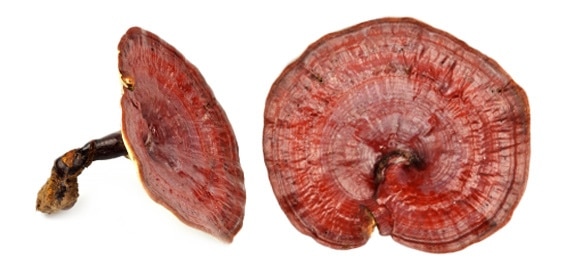
Written By: Gloria Tsang, RD
Title: Founding Registered Dietitian
Alumni: University of British Columbia
Last Updated on:

In China and Japan, Reishi mushroom has been used for more than 4,000 years to treat a variety of ailments and provide calming effects, including lowering blood pressure. Modern research has focused on the mushroom’s anti-allergic, anti-inflammatory, antiviral, antibacterial, and antioxidant properties. In Asia, reishi mushrooms are found growing on decaying stumps and logs. There are six different colors of reishi, but Chinese elders believe red is the most effective. Red reishi mushroom is also the most commonly available in North America, where it is cultivated. In the United States, reishi is regulated as a dietary supplement, and is usually found as a powder, tincture, or extract. You may also be able to find dried sliced or whole reishi mushrooms, which can be used to make tea or broth.
Table of Contents
1 oz of fresh reishi mushroom contains:

Reishi mushrooms contain beta-glucan polysaccharides, triterpenes, and other natural biological compounds. According to Memorial Sloan-Kettering Cancer Center, these components may help support the immune system in cancer patients, alleviate nausea brought on by chemotherapy, and enhance the effects of radiation therapy.
A small 2003 study in Immunological Investigation found that 12 weeks of treatment with reishi extract did improve the immune response of patients with advanced cancer, and a 2010 review published in Clinical and Experimental Metastasis found that reishi may help prevent cancer from spreading.
The same compounds that support immune function in cancer patients help boost immunity in others as well. Reishi’s antiviral, antibacterial, and antioxidant properties all help to support the immune system.
Liver Disease
Reishi is a traditional remedy for liver disease in Asian cultures. The polysaccharides in reishi may help to protect liver cells, and the antioxidant properties of reishi help support liver function. Reishi is believed to improve liver detoxification, liver cell regeneration, and overall liver function.
An article published in Herbs for Health in 1997 described a 1970s study in which more than 2,000 Chinese patients with chronic bronchitis reported feeling better and having increased appetite after two weeks of treatment with reishi mushroom extract, and a 1990 study at the University of Texas Health Center found that reishi could be used to treat bronchitis, among other complaints. This may be because of reishi’s anti-allergic and anti-inflammatory effects.
These effects are also beneficial for asthma sufferers, as are the the antihistmine properties of the oleic acid and cyclooctasulfur found in reishi.
The many biological compounds in reishi mushrooms may also help prevent heart disease, both by lowering blood pressure (a traditional use of the mushroom) and potentially by lowering cholesterol.
Treatment of insomnia is another traditional use of reishi, and I personally take reishi to help me stay asleep through the night. Long-term use may help promote slow-wave sleep.
In China, monks have used reishi for centuries to quiet their minds in preparation for meditation.
Reishi is very woody and fibrous, so it’s not a mushroom you’ll want to use fresh.
Alumni: University of British Columbia – Gloria Tsang is the author of 6 books and the founder of HealthCastle.com, the largest online nutrition network run by registered dietitians. Her work has appeared in major national publications, and she is a regularly featured nutrition expert for media outlets across the country. The Huffington Post named her one of its Top 20 Nutrition Experts on Twitter. Gloria’s articles have appeared on various media such as Reuters, NBC & ABC affiliates, The Chicago Sun-Times, Reader’s Digest Canada, iVillage and USA Today.
asthma, bronchitis, cancer diet, grocery aisle, healthy every month, heart smart, immune booster, insomnia, lingzhi, mushrooms, reishi